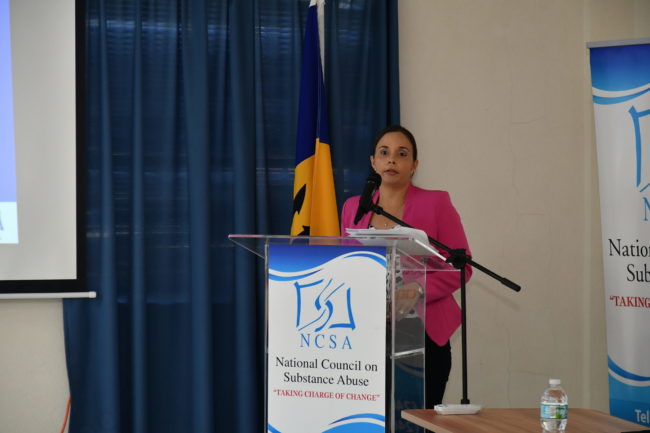By Anesta Henry
Legislative changes appear to have led to a reduction in persons charged with possession of cannabis.
However, Research and Information Officer at the National Council on Substance Abuse (NCSA), Laura Foster, is reporting an increase in the number of persons being charged with more serious offences, such as trafficking and supplying the drug.
“This seem to coincide with those legislative changes and it may be a reflection of the fact that there are fewer persons being charged now with small-scale possession as opposed to before the legislation was changed,”
Foster said as she delivered the 2021 Barbados Drug Information Network (BARDIN) report, at the NCSA office, Corner of 1st Avenue Belleville and Pine Road, St Michael, on Tuesday.
Recent legislative changes include the enactment of the Medicinal Cannabis Act 2019, Sacramental Cannabis Act 2019 and the Drug Abuse (Prevention and Control) (Amendment) Act 2020.
Foster has also observed that there has been a marked decrease in people seeking help for substance use.
Speaking on the number of cannabis possession cases adjudicated in the Magistrates’ Courts in 2019 versus 2021, Foster said statistics show that there was a sharp decline of 71 per cent in the number of cases in the court system related to possession of the drug.
“This would translate into a reduced load from the penal system but it also will then mean that that will bring with it lower costs, and that includes lower costs when it
comes to incarceration in cases where persons receive a custodial sentence. So that is definitely an advantage both judicially and economically.
“Now at the individual level, we know that persons with a criminal record tend to be stigmatised. As a result they tend to have difficulties getting employment, they tend to have difficulties getting travel visas and they face other forms of discrimination as well. For them, avoiding a criminal charge is going to be a plus. But that is not the be all and the end all.
“We need to make sure that persons who are depending on the substance can receive the help that is needed,” she said.
And while there has been a decrease in persons being charged, Foster noted that the NCSA has not observed an increase in counselling for clients even though the Drug Abuse Act makes provision for persons to be sent to the council for assessment and counselling.
She noted that there was also a marked decrease in the number of persons seeking treatment for substance use and disorders since the onset of the COVID-19 pandemic.
Foster said these developments mean that the NCSA must begin talks with key stakeholders in an attempt to figure out why persons with substance abuse issues are not being referred to the council.
“It’s important for us to make sure that everything is in place so that persons can be diverted to the NCSA as the law intends,” she said.
The research officer also said that Barbados should follow the example of other countries and monitor the impact of marijuana use at a national level.
She explained that international and regional studies have provided mixed results revealing a relationship between relaxed marijuana laws and its use while others show that there is no relationship.
“At the NCSA we are planning a secondary school survey. We are hoping that we can get that off the ground before the end of the academic year and it should help us to partially address the data gap. But we need to do more. We need to do some more surveys, nationally representative ones, but we also can do some qualitative research. We can also do some rapid assessment studies so that we can get speedy results on certain things as well and we can focus on adolescents and other special groups,” she said.
BARDIN is a tool used by the NCSA to monitor the local drug situation, and through the publication of annual reports, it continues to be a critical source of valid and reliable information for both Government and key stakeholders.
The 2021 report is the 11th in the BARDIN series, and points to a situation that remains largely unchanged with traditional drugs such as alcohol, marijuana and cocaine continuing to be dominant.
The report also shows that young people, particularly those age 40 and under, are most likely to be involved in the drug situation, either as treatment seekers or drug
offenders.




